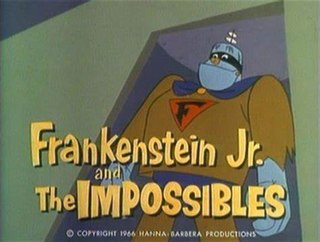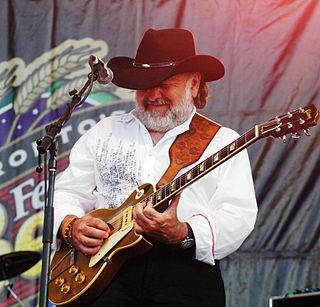
The American Broadcasting Company (ABC) is an American commercial broadcast television and radio network that serves as the flagship property of the Disney Entertainment division of the Walt Disney Company. ABC is headquartered on Riverside Drive in Burbank, California, directly across the street from Walt Disney Studios and adjacent to the Team Disney – Roy E. Disney Animation Building. The network maintains secondary offices at 77 West 66th Street on the Upper West Side of Manhattan, New York City, which houses its broadcast center and the headquarters of its news division, ABC News.
A music video is a video that integrates a song or an album with imagery that is produced for promotional or musical artistic purposes. Modern music videos are primarily made and used as a music marketing device intended to promote the sale of music recordings. These videos are typically shown on music television and on streaming video sites like YouTube, or more rarely shown theatrically. They can be commercially issued on home video, either as video albums or video singles. The format has been described by various terms including "illustrated song", "filmed insert", "promotional (promo) film", "promotional clip", "promotional video", "song video", "song clip", "film clip", "video clip", or simply "video".

Dame Lesley Lawson, widely known by the nickname Twiggy, is an English model, actress, and singer. She was a British cultural icon and a prominent teenage model during the swinging '60s in London.
Broadcast syndication is the practice of content owners leasing the right to broadcast their content to other television stations or radio stations, without having an official broadcast network to air it on. It is common in the United States where broadcast programming is scheduled by television networks with local independent affiliates. Syndication is less widespread in the rest of the world, as most countries have centralized networks or television stations without local affiliates. Shows can be syndicated internationally, although this is less common.

William Garrett Walden, known as W. G. Snuffy Walden, is an American musician and composer of film and television soundtracks. Walden is an Emmy Award winner for the theme music to The West Wing (NBC), has been nominated for numerous other Emmys throughout his career, and has received 26 BMI Awards.

Shining Time Station is a children's television series jointly created by British television producer Britt Allcroft and American television producer Rick Siggelkow. The series was produced by Quality Family Entertainment, in association with Catalyst Entertainment in seasons 2 and 3, for New York City's PBS station WNET, and was originally taped in New York City during its first season and in Toronto during the rest of its run. It incorporated sequences from the British television show Thomas the Tank Engine & Friends, which was in turn based on the books of The Railway Series written by the Reverend Wilbert Awdry.

Britt Ekland is a Swedish actress, model, and singer. She appeared in numerous films in her heyday throughout the 1960s and 1970s, including roles in The Double Man (1967), The Night They Raided Minsky's (1968), Machine Gun McCain (1969), Stiletto (1969), and the British crime film Get Carter (1971), which established her as a sex symbol. She also starred in several horror films, including The Wicker Man (1973), and appeared as a Bond girl in The Man with the Golden Gun (1974).

Scopitone is a type of jukebox featuring a 16 mm film component. Scopitone films were a forerunner of music videos. The 1959 Italian Cinebox/Colorama and Color-Sonics were competing, lesser-known technologies of the time one year before the Scopitone in France.

Filmways, Inc. was a television and film production company founded by American film executive Martin Ransohoff and Edwin Kasper in 1952. It is probably best remembered as the production company of CBS's "rural comedies" of the 1960s, including Mister Ed, The Beverly Hillbillies, Petticoat Junction, and Green Acres, as well as the comedy-drama The Trials of O'Brien, the western Dundee and the Culhane, the adventure show Bearcats!, the police drama Cagney & Lacey, and The Addams Family. Notable films the company produced include The Sandpiper, The Cincinnati Kid, The Fearless Vampire Killers, Ice Station Zebra, Summer Lovers, The Burning, King, Brian De Palma's Dressed to Kill and Blow Out, and Death Wish II.

The Box, originally named the Video Jukebox Network, was an American broadcast, cable and satellite television channel that operated from 1985 to 2001. The network focused on music videos, which through a change in format in the early 1990s, were selected by viewer request via telephone; as such, unlike competing networks, the videos were not broadcast on a set rotation.

Frankenstein Jr. and The Impossibles is an American animated television series produced by Hanna-Barbera Productions. It premiered on September 10, 1966 on CBS, and ran for two seasons on Saturday mornings.
Seeburg was an American design and manufacturing company of automated musical equipment, such as orchestrions, jukeboxes, and vending equipment. Founded in 1902, its first products were Orchestrions and automatic pianos but after the arrival of gramophone records, the company developed a series of "coin-operated phonographs."

A jukebox musical is a stage musical or musical film in which a majority of the songs are well-known, pre-existing popular music songs, rather than original music composed for the musical.

Princesses is an American television sitcom that aired on CBS from September 27 to October 25, 1991. The series was produced by Universal Television and lasted five episodes. The series theme song, "Someday My Prince Will Come", was performed by The Roches.
Twiggy the Water-Skiing Squirrel is an animal novelty act featuring an eastern gray squirrel who skis around a heated pool. The original Twiggy was adopted in 1978 by Florida roller-skating rink owners Chuck and Lou Ann Best. They taught her to water ski, which made international news. The Best family began traveling with Twiggy for national tours, film appearances, and media profiles. Forty years after Twiggy's debut, Chuck and Lou Ann Best's son, Chuck Jr, took over operations of the squirrel performances. Twiggy doesn't mind water-skiing, according to Lou Ann Best, who told The Washington Post in 2016 "there's nothing unnatural about what she's doing."

Video Jukebox was an American television program which aired from 1981 to 1986 on HBO. It was a monthly series that showcased music videos from the popular recording artists of the time such as Duran Duran, Michael Jackson, Prince, Culture Club, Linda Ronstadt, David Bowie, Bow Wow Wow, Kim Wilde, Hall & Oates, Madonna, Blondie, Rush, and The Human League. A typical episode of Video Jukebox consisted of seven or eight music videos and lasted roughly 30 minutes, and the lineup changed in the middle of each month.

Richard Cooper is a Canadian musician and writer based in Ottawa, Ontario.

The Hostage Tower is a 1980 American spy and thriller television film starring Peter Fonda and Douglas Fairbanks Jr., and directed by Claudio Guzmán, well known for his work in sitcoms. It is based on a story by Alistair MacLean. A book based on MacLean's story by John Denis was the first in the series of UNACO books.
Supersonic was a British television music show, which featured pop music artists of the day, one of the many attempts by ITV to equal the success of the BBC's Top of the Pops. Launched in 1975, the show typically lasted 25 minutes and was produced by London Weekend Television for the ITV network, running for two years.














